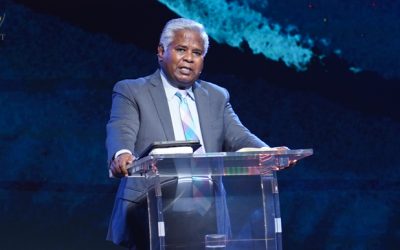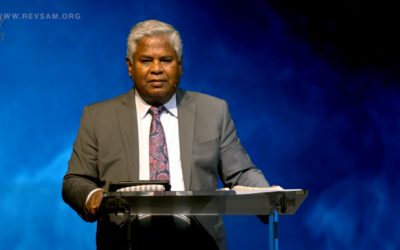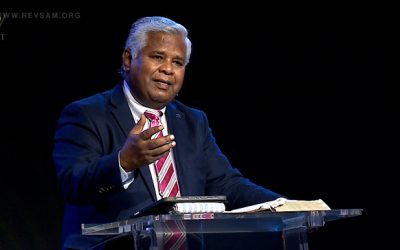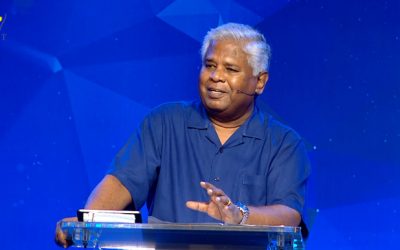
How Grace Changes Us? (Part 12): Fruit of the Spirit
Sunday English Service – 13 FEB 22
Transcript
Please turn with me to 1 Corinthians, chapter 13. 1 Corinthians, chapter 13. We’ve been teaching a series called “Abounding grace”. The apostle Paul said in Romans 5, verse 20, “Where sin abounded, grace did much more abound”, means that sin by nature abounds, exercises its power, tremendous power over people, brings them into slavery, rules over them, ruins them. But when God saves people, He gives His grace to them. And grace is even more powerful than sin. Whatever sin ruined; grace restores. Not only does it restore, but it also makes it even more beautiful and wonderful than it ever was. This is the work of God’s grace.
So, in the last few weeks, we’ve been talking about how grace changes us. And for that, we went to 1 Corinthians 13, because 1 Corinthians 13 highlights a very important truth. And that is, it shows us the difference between the marks of a supernaturally changed heart and a heart that is just a morally restrained heart. The difference between a morally restrained heart and a supernaturally changed heart. In 1 Corinthians 13, verse 3, the apostle Paul says, “And though I bestow all my goods to feed the poor, and though I give my body to be burned, but have not love, it profits me nothing”. The way he says it, it means that without love, without having ever been touched by God’s power in the heart, without a change of heart of any kind, a person can be extraordinarily good, a person can do good works, without any change of heart. And after saying that, he goes to verse 4, and says, “Here are the marks of a changed heart now”. First, he points out that without a changed heart, a person can do extraordinarily good works, like feeding the poor, by selling everything that he has to feed the poor, and even giving his body to be burned. “Without love, he can do it. But a person who has love, a person who has a changed heart, these are the marks of that person”, he says. And look at that, from verse 4. Love suffers long and is kind; love does not envy; love does not parade itself, is not puffed up; does not behave rudely, does not seek its own, is not provoked, thinks no evil; does not rejoice in iniquity, but rejoices in the truth; bears all things, believes all things, hopes all things, endures all things. Love never fails. So, here we have a big list. But the main characteristic or mark of a person who has got his heart changed by the power of God, is love. And then, it describes what all that love does.
Now, this kind of list is available in many other places also. You have a list in Colossians 3, another list in Ephesians 4, all listing the marks of a change heart. There’s another major list in Galatians 5, and I want to go to it today. I want to talk about that list. Usually, we’ve been taking one item from these lists, and then going to a larger passage which deals with that particular issue and teaching from it. But today, we’re going to take the entire list that is there in in Galatians chapter 5 and verse 22 to 23. But I’m not going to read just those two verses; I’m going to read from verse 16, all the way to 25 because we’re going to talk in light of all those verses, deal with was 22 and 23 in light of all those verses. Let me read from verse 16: I say then: Walk in the Spirit, and you shall not fulfill the lust of the flesh. For the flesh lusts against the Spirit, and the Spirit against the flesh; and these are contrary to one another, so that you do not do the things that you wish. But if you are led by the Spirit, you are not under the law.
Now the works of the flesh are evident, which are: adultery, fornication, uncleanness, lewdness, idolatry, sorcery, hatred, contentions, jealousies, outbursts of wrath, selfish ambitions, dissensions, heresies, envy, murders, drunkenness, revelries, and the like; of which I tell you beforehand, just as I also told you in time past, that those who practice such things will not inherit the kingdom of God.
But the fruit of the Spirit is love, joy, peace, longsuffering, kindness, goodness, faithfulness, gentleness, self-control. Against such there is no law. And those who are Christ’s have crucified the flesh with its passions and desires. If we live in the Spirit, let us also walk in the Spirit.
So, we’re going to consider the list that is there, given as ‘fruit of the Spirit’, in verses 22, and 23 nut in light of all those verses that I just read. We’re not just taking one item today, we’re taking all the items listed here, and looking at them, in general, as a whole. Now, we’re going to do two things. One is, we’re going to look and see how we can know that we have the fruit of the Spirit in our life. That means, how can we evaluate, understand, and recognize them in our lives? How do you know that it’s there, the fruit of the spirit is there in your life? So, we’re going to talk about how you can know, how you can evaluate, how you can understand, recognize it in your life. Secondly, we’re going to talk about how to grow, grow them and grow in them. So, it’s only those two things we’re going to talk about today.
Firstly, let’s talk about how to recognize them in our lives, how to understand them, how to see whether it’s there or not. The first thing to know about the supernaturally produced spiritual fruit and character is that it shows up, internally. It is something that happens internally in a person. Now, look at verse 22, and 23, where the list is given. It says, “But the fruit of the Spirit is love, joy, peace, longsuffering, kindness, goodness, faithfulness, gentleness, self-control. Against such there is no law”. I’m sure you’ve read this ‘fruit of the Spirit’ many times, these verses many times, but have you ever thought about what this statement means, right after that list? “Against such there is no law”. What does it mean when it says, “Against such there is no law”? It means that passing a law against, for example, joylessness or against peacelessness is useless. If you pass a law tomorrow, if you decide to pass a law saying, “You cannot be without joy. If you’re without joy, we’re going to send you to jail. You’ve got to have joy”. And you cannot do that, you cannot bring about joy or peace or anything by passing laws. It is not possible at all. Why? Why is it useless? Because law is something that works only on the outside, in the action level. You know, suppose for example, you pass a law against murder. There are laws against murder, and certain punishments specified against murder. Now, that helps control the number of murders that happen. Certainly, thank God for the laws. It controls the number of murders that happens. So, law does something on the external level, on the action level. It stops the murder from happening to an extent, the act of murder from happening, but it does not deal with the heart that produces that murder. Have you ever thought about that?
Jesus, in the Sermon on the Mount, when He was teaching about murder, He said, “If you look at your brother and call him a fool, that amounts to murder.” In other words, He’s saying, deal with the thing when it starts in the form of anger in your heart, because that is what later on results in murder. Later on, it grows into murder. It starts with anger then results in murder. So, anger is the basis. Anger is the place where the starting point of murder is. So, the laws against murder deal only with the action that happens as a result of all the anger and the frustration that goes on in a man’s heart. As a result of this, it only deals with the result. It does not deal with what is wrong in the heart.
Take, for example, the example of stealing. You can pass laws against stealing and there are laws against stealing. There are specified punishment against stealing. Thank God for that. And that, I believe, reduces the number of thefts that go on. It deals with it on that level, on the result level. But it does not deal with it in the heart level. What is the heart that produces theft? The heart that produces theft is a heart that is filled with jealousy and envy. It looks at other people having much and this heart says, “Oh, I don’t have as much as he’s got”. And he’s got such envy and jealousy and he’s after that stuff that the other guy has and wants to have as much as he has. Therefore, in the end, he decides to have it even by stealing. That’s how stealing happens. Now, that is not dealt with. That envy is not dealt with, that jealousy is not dealt with. Outward act of theft is dealt with. The law only deals with the outward acts, not with the inward heart, where the problem is. The problem is in the heart that is what produces the outward action. But the law only deals with outward actions.
Take for example, rape. Some time ago, I remember in India, we had a lot of this problem. And people started talking about this and complaining about this in every television program. This was a matter of discussion. And so, they passed some very strict laws and so on. I’m sure that it helps. Law helps in stopping the rape from happening to a certain extent. But the law cannot deal with what produces the rape. What produces the rape is the distain for women, which is at the bottom of that thing. That is the reason for the rape. The disdain for a woman. A man looks at the women and he has this attitude that women are not to be respected, they can be violated, they can be used any way, any which way you want. The disdain for women, is the thing that results in rape. But law does not deal with the heart. This is the weakness of the law. That is why, here we read, “Against such things there is no law”. In other words, you cannot pass a law to make the heart change. You cannot say, you have to have joy, you cannot say you have to have peace, you cannot say you have to have, you know, whatever is listed here, gentleness, self-control, and all of that. And otherwise, you’re going to be punished. You cannot. You can control some of the actions that result from this, but you cannot deal with the heart. You cannot legislate and lay down the law against these things. That’s why it says, “Against such there is no law”. So, law doesn’t work with these things. You cannot pass a law saying you’ve got to be joyful; you’ve got to be full of peace. And you cannot be here without these things, you know, long suffering, kindness, goodness, is required, otherwise, we’ll throw you in jail or something like that. It doesn’t work.
So, if the law does not deal with the heart, but only deals with the actions on the outside as a result, then what will work in the heart? The answer is given right here, in verse 22: The fruit of the Spirit. The Spirit is the answer. The Spirit of God and the work of the Spirit of God in the heart of man. The Spirit of God goes where law cannot go. The Spirit of God is able to do what the law cannot do. The Spirit goes and deals with the things that the law cannot deal with. The Spirit of God comes and resides in a person and implants in that person, new thoughts, new desires, a new kind of attitude. The Spirit can change the external also, the behaviour or the action also. But the Spirit changes, starting with the heart, then dealing with the heart change results in action. And deals with the root of the problem. The Spirit can change the heart as well as the result, resulting action. But law can only change the resulting action, not the heart. Alright.
Now, what does this mean, practically? Practically, this means that the Spirit shows up inside and changes the inside. You need to understand the Spirit of God brings about changes on the inside of a person. So, if you want to know whether you have the fruit of the Spirit, you can’t look outwardly. You cannot look at the actions of a man. That’s why 1 Corinthians 13:3 is very important. A man may sell everything that he has to feed the poor, even give his body to be burned, but not have love. Doesn’t have any love, but he does this. And what are you going to do? Look at the action, look at him selling everything that he has, giving it to the poor, and say, “Here is a man with a changed heart, changed by the power of God?” No! Man may do that, for so many reasons. Maybe he’s guilty, maybe he is seeking some kind of recognition or power, position, fame, name, whatever. You know, we don’t know what people do these things for. But there are some ulterior motives, there are some selfishness that may be involved for which he does these things. So, you cannot look at the outward actions, say, “Oh, he sold everything to give to the poor, therefore, he must have a changed heart. God must have changed his heart”, you know.
Bible says that’s not the way you look at the fruit of the Spirit. The fruit of the Spirit, you look at how a person is in his heart. In other words, let me put it like that – you need to know how a person is really. In his heart, what is he like? You know, to know what a person is like in his heart, you’ve got to ask the people that live with him, that are close to him, that are that are able to know him on a level that is deeper than the superficial level that everybody sees him. And sometimes, when you ask them, they will say, “Oh, that guy is just an irritating guy. He’s full of jealousy, he’s full of envy. He’s got a petty mind. He’s selfish. He’s got such arrogance, pride. Now, that means there is no change in the heart. But actions are there, speaking something else, but those that are closest to him understand that in the heart, he is a totally different person.
Let me look into it in a little more in detail. Look at the way we raise children, many times. We raise a child to be a moral person. How do we do it? That’s the thing. How do we do it? We tell the child, first of all, “Well, if you do anything wrong, if you steal, if you lie, you’re going to be caught”. Caught by who? God is going to catch you because God is looking. God knows everything. He’s going to catch you; He’s going to deal with you. He’s going to give it to you, man. You know, you can’t escape from God’s eyes. He knows. Plus, the police may get you. Plus, I’ll catch you. All these things we say. You see, what happens in the process of just making a child moral, you’re putting fear, anxiety, and all kinds of things into the into the child. Secondly, we say, “Well, if you do this, if you do anything bad, people will despise you. Nobody will like you. Nobody will respect you. Nobody will look up to you”. Then we tell him, thirdly, “Well, if you do these things, you won’t even respect yourself. You won’t have any respect for yourself”.
Now, are we making these kids moral? Yeah, there may be some behavioural changes. Maybe he’ll keep away from stealing and, you know, doing certain things, because you warned him like this. But you do it at the expense of the child not having any joy, peace and longsuffering, kindness, goodness, faithfulness, gentleness, self-control, all of those things. No heart change. There’s nothing in the heart, but only in the action that is something that is happening. That fear, that pride, that arrogance, that anxiety, that jealousy that’s in the child, which is not dealt with, which you haven’t dealt with at all, you’re just delaying the law, telling him, you know, “The law will get you”. And because of that, all this fear, pride, arrogance, anxiety, and jealousy, and all of those things will show up in his very intimate circles, from the inside. It’ll have to come because it is there, and it will come. Now, when a person behaves very well on the outside, and very poorly, when he is by himself, or very poorly when he is in his intimate circles, then that shows the difference between a morally changed person and a heart-changed person. A person who’s changed in the heart will be a wonderful person to be with intimately. The morally changed, just by moral restrictions, the person has changed, only the actions have changed. That person will look good on the outside, but he is different on the inside.
So, how do you know whether you’ve got the fruit of the Spirit or not? You know it by looking at the inside? What is there on the inside, not just the actions. Christians ought to know. You’re not to just look at the actions but look at the heart. If the heart is right, then he’ll be a really wonderful person, even to those that are very closest to him. Alright.
Secondly, how can you know that you have the fruit of the Spirit? The fruit of the Spirit, come together. You have a big list here but they all come together. The way that most people think of this is, they look at this and say, “Well, I have joy and peace, but longsuffering? Well, not much”, they’ll say. “I have kindness, goodness, and faithfulness. But self-control? Oh, no. I don’t have much self-control”. And we think that’s the way people are. That some of these qualities may be found in people, some of it will not be found. You know, a person cannot have all of these. In our country we have, I think everywhere, all human beings are philosophers. They’re all armchair philosophers. We philosophize a lot. And I’ve heard people say, “Well, everybody doesn’t have everything. Some people have something, some other people have some other things. One person may have this and may not have that. He may have self-control, but he may not have gentleness. He may have longsuffering, but he will not be faithful”, you know, things like that. That’s the way we traditionally think about things and look at things. But the Bible says that the fruit of the Spirit cannot come like that. It comes in a package all together. Maybe not in the same measure, not very symmetrical, not exactly the same measure, but they come all together as a package. And a person who’s found with that, is growing in all of those areas.
Now, where do I see that? Where does it say that? It says it in verse 22. It says, “But the fruit of the Spirit…” Fruit of the Spirit – listen to that. It’s mentioned in singular, not plural. The fruit of the Spirit is, then it gives a big list. Love joy, peace, longsuffering, kindness, goodness, faithfulness, gentleness, and self-control. So, the fruit of the Spirit is singular but what it does or what it behaves like, is all in a long list that tells us that these traits are not individual, they are not separate traits. They interpenetrate and they are interdependent on each other. They don’t come separately; they come together. Let’s give some examples, then you’ll really understand. Take for example, some people you’ve seen are very gentle, and kind, right? Very gentle, and kind. But they don’t seem to have the boldness. They don’t seem to have the boldness. They have gentleness, but they don’t have boldness, they don’t have courage.
Now, what about that person? Why is he like that? Now, the gentleness of a person, if it is a heart change, if it is done by the Spirit of God, if it is because of the Spirit of God that has come, that gentleness will also have the positive quality of boldness, courage. Courage is a good quality, to have it. But if he has just gentleness and does not have boldness also, the thing is that gentleness may be a natural temperament of the person, when people are generally, naturally gentle. Have you seen people like that? And it’s good. In many cases, it’ll be good for them to be gentle, not rude, and not bombastic, or, you know, arrogant, and so on. They’re gentle; it’s nice. But the thing is, if you don’t have boldness, this natural gentleness that’s in the person, for the most part, it ends up being cowardice. You know, cowardliness. It ends up being that, you know. When it’s a changed heart, the heart has been changed by the Holy Spirit, it will have both gentleness and boldness.
Take for example, Moses. Bible says he’s a man that was so gentle, there’s nobody like him in the whole world. He was the gentlest man in the whole world. The perfect gentleman, gentle in nature. Now you cannot say that he was like that all the time. Remember, he actually killed a person before he started. Just in a rage, in a moment of rage, in a moment of quick decision, he decided to kill a person. That’s why he had to run away from Pharaoh’s palace and spend time in the wilderness and so on. That’s where God met him and called him and so on. Then he changed and had gone through a great change. And God put these qualities within him, that he was later known as the gentlest person. But he was also a very courageous person. Just imagine 30 lakhs of people – 30 lakhs are three million people. Three million people, he managed. Not three million wonderful Christians. Three million troublesome people. If you didn’t get them food in time, they want to take up stones to kill you, you know, that’s what’s going to happen. If they didn’t have water, they started murmuring, they started talking. They said, “Oh, this man has brought us here to die in the wilderness. He should have left us back there. From the time we started, we knew that this is going to happen. He’s going to bring us into the wilderness and have us die”. There he brought water from the rock. Amazing miracle. You know, the coolly drank the water and then they said, “What about some food?” And food came by way of Mana. They said, “What about some meat because we’re used to eating nice chicken curry and stuff like that? Garlic chicken of Egypt. How about some chicken curry?” This is the way they were. If you didn’t give them what they wanted, they will go into a rage and they’ll kill you, literally. They were ready to throw him out and make themselves a leader and return back to Egypt. That kind of people and three million of them. This man had the courage and the confidence and the boldness to manage them, so that everyone will listen to his voice, and follow his voice. God gave him such courage. That’s a divine quality. But at the same time, he was gentle. If he didn’t have gentleness, when they took up stones to kill him, he could have brought fire down from Heaven, or done something like that. He was a gentle person. At the same time, he was a bold person. What a great quality had to have in a great leader. Jesus, for example, He said, “Take my yoke upon you and learn from me, for I am gentle”, He said. Here is a gentle person. He says, “I am gentle; come and learn from me how to be gentle.” But you can’t say that He’s a cowardly person. No. He was a bold person. He was a person with great courage and confidence. So, the fruit of the Spirit is something that comes in a package, all of them together. You cannot have one and not have the other. You have to have all of it, not in the exact same size of proportion but you have all of it together in some measure, and you grow in it. That’s the way the Bible presents.
So, first of all, you know that you have the fruit of the Spirit when you look at the heart. Don’t be fooled by the action on the outside, because a man can do extraordinarily good works on the outside but not be changed in the heart also. Heart change – it is something that happens in the heart. The fruit of the Spirit is of the heart. Secondly, the fruit of the Spirit comes as a package all together. All the things mentioned in the list come together. Thirdly, it’s gradual. It’s gradual. Where does it say that? In 5:22, in Galatians 5;22, it says, “The fruit of the Spirit…” Now, notice the emphasis must be on the word “fruit”. The fruit of the Spirit. Now, against this, you compare verse 19, “the works of the flesh”, it says. The fruit of the Spirit versus the word of the flesh. Look at the two words: fruit and works. Works are deeds, are actions and actions don’t take much time. You can act just like that. An action can happen just like that. Doesn’t have to take much time. But a fruit – you’ve got to plant the seed, you’ve got to water it, you’ve got to wait for it to even really show its head out for a long time, sometimes and then it grows. It takes a process of growing even after you see the fruit there, it’s not fully grown, and not fully ripe and so on. It takes so long for fruit to become usable. So, a fruit takes a long time. Action takes a very short time. It happens just like that but fruit takes a long, long time.
Now, when you’re growing some tomato or something like that, you don’t go and dig up after you sew the seed. You don’t go and dig up after a few days to find out what’s happening on the inside. Anybody that knows this stuff, knows that things are happening on the inside. Your naked eyes cannot see the growth. Growth is not visible to your naked eyes but growth is happening, nevertheless, on the inside. Even when it shows up a little bit, sprouts up where you can see it, still you don’t see growth with the naked eye. Take for example, your children growing right in front of you. When your children grow, you don’t look at your child and say, “Hey, you’ve grown maybe half an inch from yesterday. It looks like you you’ve grown a little bit more.” No, you don’t see the growth, actually. You don’t actually see the growth. It’s only when you put him against the wall and measure him with a scale to see what he is compared to what he was six months ago. Then you find that there is a difference. You know, you don’t see it just like that. It’s not visible to you just like that. Maybe a person who hasn’t seen him for a year or two will come by and say, “Hey, he’s grown up a lot since the time I saw him last”. But those that are with him every day, they cannot see the growth. It is not so visible but it is happening.
The reason we need to understand this, we should not look at ourselves and say, “Well I’ve been a Christian for so long, I don’t see any growth. I don’t see any growth. Just like you have to go measure your child in order to find out how much he has grown. There are sometimes you can do some measurements spiritually also. Have you ever looked at yourself and said in some situation that you faced, have you ever said of yourself, “Well, if it happened five years ago, that would have been a different thing”? Five years ago, my reaction to it would have been totally different. But look what has happened in five years. In five years, I’ve changed?” How many times have you said that? See, that is growth. It is not so visible, it is not so seen but yet, it is happening. There are ways to measure it. There are ways to know that the growth is happening. So, never be discouraged. It takes time, it grows and so on.
Now, the last thing. I have to explain it and then it’ll explain itself. Look at verse 17, in Galatians chapter 5: For the flesh lusts against the Spirit, and the Spirit against the flesh; and these are contrary to one another, so that you do not do the things that you wish. Here it’s talking about the flesh lusting against the Spirit and the Spirit lusting against the flesh. In other words, he’s saying that the Christian has two things going on in him The flesh, that is a sinful nature. The word “flesh” is a very highly theological term. You’ve got to explain it, so I’ll just go with the words, “sinful nature”. The sinful nature in a person causes a person to lust against everything that is spiritual. In other words, you have desires that are spiritually unacceptable, but a spiritual person that is working itself into you on the one hand. From the sinful nature, it is coming in. “The flesh lusts against the Spirit”, he says. But he says, “The Spirit also lusts against flesh”. There is another side to it and that is, you are now a spiritual person. You are now a child of God. And therefore, your spirit now lusts—literally produces desires, that’s what lust means—produces desires that are in line with God’s holiness and God’s goodness. And it is against all the sinful desires. So, one to one side, sinful desire being probed by the sinful nature. On the other side, the divine nature that is in you is bringing about some holy desires on this side. And then he says, in verse 17, “Because your flesh is lusting or our sinful nature is lusting against the Spirit, you don’t do the things that you wish.” Have you ever found that to be true? You wish to live for God, you wish to do the things that pleases God, you wish to live a holy life, but you’re not able to do because the flesh lusts against the Spirit. The flesh is causing the problem, that’s why. Just like Paul says, “So that you don’t do the things that you wish because sin causes lust against the Spirit.”
So, you don’t do the things that you wish. But the good news is that is: There is a spiritual side for you, now that you’re a Christian, now that you’re a believer. That is lusting against the flesh. Listen to me, “Where sin abounded, grace does much more abound”. Yeah, sin lusts against the flesh. It’s a strong lust; it’s a strong desire. It’s a strong thing that rises up within you and motivates you to do something wrong. But there is a stronger desire on the other side. The spirit lusts against the flesh, against the sinful nature, against all that sin. There is a spiritual desire, that cause, that is brought about in you by the Holy Spirit, that is dwelling in you for this very purpose. He’s dealing with your heart. He’s bringing about spiritual desires and it is much stronger than the sinful desires.
Now, let me say one thing here; let me give you a small example. Many years ago, there was a young man here, he’s not here now, he’s gone abroad. Young man, a fine young guy. He came here and really gave his life to the Lord. He was it was a little bit of maybe a partying kind of person, you know, where all the habits that’s not desirable for a young man to have and so on, and what he gave himself to the Lord and had a remarkable change in his life. He quit all those habits, all that kind of stuff that he was doing. And he was leading a totally different life for some time. And all of a sudden, one day, I have found him right after a Tuesday night service, he’s standing there and he’s weeping and he’s got something to say to me. What has happened is during the previous days, he had gone to some party somewhere and someone had given him a cigarette to smoke. So, he started smoking one cigarette after a long time. And he felt so bad after he came home that he left all these things and now he’s picking them up. And he felt hopeless because he thought, here I am, I’ve given my life to the Lord. I’ve been living for God. How did I end up like this? Maybe I’m not saved at all. Maybe God is not working in me. Maybe this whole salvation is a hoax. Maybe nothing has happened to me. How can I fall back into this? He was greatly discouraged it seems and the next day got up and something inside of him told him you know because sin lusts against the flesh. This is how it happens. Told him, “Well, you’ve smoked one cigarette, what does it matter if you smoke ten? So, he went and got a packet of cigarettes and smoked the whole thing. He felt really bad. He couldn’t sleep; he couldn’t have peace. Then he came to church and he was weeping. And he was saying, “Pastor, this is what happened. I don’t know what to do. I don’t know what the answer is. I doubt my own salvation. I don’t think I’m saved. I don’t think I have the Holy Spirit. I don’t think there is anything that has happened to me by way of changed. If I was saved, if I was, you know, if I was a child of God, why would I ever do this and fall back into that?” I looked at him and I said, “Don’t doubt your salvation. I can guarantee you are saved. I can guarantee you; you are a child of God; you’re saved.” “So, how can you guarantee me that?” “I can guarantee you that because you’re standing right here and crying before me because you’re fallen back into the old sins. When you were sinning, you were living happily for many years. Going around sinning, going around partying, going around doing all the things that’s not acceptable. And never, did you go to a preacher crying, saying, “I’m not able to sleep. I’m restless. And I have so many problems.” You know, “What has happened to me? Has God forsaken me? You never cared about what God thought about your problems. You never cared about whether you’ve sinned, or whether you’re right. You never cared about this. You never cared about this concept of sin at all. You were happily enjoying. You were partying and you took pride in the partying. And you’d go talk next day. That’s the way all of us were at one time.
We were talking about how much we drank and what we did, what great exploits we did and so on. Everybody’s looking at me. Nobody wants to say yes to that. They say, “You talk; we will listen.” That’s the way we were, all, it never bothered us. It never bothered us that we had sinned. We actually enjoyed that while we were sinning. And then, we came and really spoke proudly about what all we had done. And we had fun talking about it. That’s why I remember being a sinner. I told this guy, “That’s the way you were, but look at how you are now. The reason you’ve come here and you’re standing here weeping and you’re so full of remorse. You regret what has happened, tells me that the Spirit is lusting against the flesh. The Spirit of God is bringing you here. The Spirit of God is causing you repentance. The Spirit of God is leading you away from the lust of the flesh, lust of the sinful nature into a desire for God. You desire God and there is a desire for God that is created by the Holy Spirit in you. That is why you’re here. That’s why I believe you are a child of God.”
I say this because there’s a lot of people that think like that. Once they fall back a little bit, they think they have lost their salvation or they have been forsaken by God and they doubt the very fact that they are saved and they’re a child of God. I tell you. Yeah, there are times when the flesh lusts against the Spirit and therefore, because of that, you do not do the things that you wish. You’re not able to do the things that you want to do. You’re not able to live the life that you want to live because the flesh is lusting against the Spirit. But I want to tell you the good news. There is a spirit that is lusting after the things of God inside of you. Lusting against the flesh, working against all this fleshly temptations and all the fleshly lusts and desires and that will cause you to win, that will cause you to return to God, that will cause you return around and so, if that is happening inside of you, if that is the way you feel about your life, you may have failed, you may have fallen back a little bit, you may have experienced some failures. But all the while, you’ve also experienced the work of the Holy Spirit drawing you back to God. If you’ve experienced that, then I say to you, the fruit of the Spirit is working inside of you. God is at working inside of you. God is living in you. The Holy Spirit is living in you. He is causing you to lust, literally, desire the things of God and seek God and to go after God more. Amen. Alright.
So, you can really know whether the fruit of the Spirit is there. You can know by looking at the inside. You can know it because it all comes together and you can know it because it’s gradual. Don’t be upset if you don’t see anything dramatic right away. It’s gradual, slow. You can know it because there is this battle going on inside of you, that’s a good sign that you have the Spirit of God working inside of you. Before there was no battle. Sin had its own way and sin had its own dominion inside of you, but it’s not so, now. Now, the Spirit of God lusts against the flesh and causes you to live a life for God. Alright.
Now, how do you grow in this? Let’s talk about that. How do you grow in it? Now, when you end up acting according to your sinful nature, immediately, the first thing that you need to do is, you need to find out why you act as you do. That’s, I think, the first way to do it. Now, let me read the verse 25 or 24. Look at verse 24. It says, “And those who are Christ’s…” Now, how many of you are Christ’s? are you Christ’s? Those who are Christ’s—listen to this—have crucified the flesh with its passions and desires. Now, first of all, let me say there is a difference between this, where it’s talking about, “those who are Christ’s have crucified the flesh with its passions and desires”. And Romans chapter 6, verse 6, remember? And Galatians 2:20, where it says that “we are crucified with Christ”. Have you read that? It said, “We are crucified”. Our old man was crucified with Him – Romans 6:6 says and Galatians 2:20 says. Galatians 2:20 says, “I have been crucified with Christ”. So, there is a difference between saying, “I have been crucified with Christ” and saying what verse 24 says here, that those who are Christ’s have crucified the flesh with its passions and desires. Two things are different. One says, you’ve been crucified with Christ. The other says, Christians are those who belong to Christ, are those who have crucified the flesh and its passions and desires. Totally different wording. Here it’s talking about crucifying the flesh with its passions and desires. There, it’s talking about being crucified with Christ.
I’ll tell you what that is all about. Being crucified with Christ is a matter of identification. It means that Jesus has taken your place as a sinner. You ought to have died on the Cross, you needed the punishment, you were to be punished. The wages of sin is death. You should have experienced that death. You should have experienced that whipping. You should have experience that punishment. You should have given your life because the wages of sin is death, but instead, He became your substitute. He got on the Cross. He took your sin. He took your punishment. He took your curse. He took God’s wrath on your behalf. He became as you are in your sinfulness, so that you can become as He is in His righteousness. The exchange that happened there was that He took your sin and became like you and died as a cursed One on the Cross and you took His righteousness and you have become righteous in the sight of God. You’ve become a child of God. That’s identification. They call this doctrine, ‘identification’. Christ became identified with you. He became like a sinner, identified with you, so that you can become identified with Him, that you became righteousness with the righteousness of Christ Himself.
So, that’s identification. That’s one thing. But what this is talking about here when it says, “Those who are Christ’s have crucified the flesh with its passions and desires”. It’s a totally different ballgame. This is talking about something else. It’s talking about Christians as ones who have crucified the flesh with its passions and desires. They have crucified the flesh, with its passions and desires. How do we understand this? How do you crucify the flesh with its passions and desires? We need to understand this whole idea of flesh and what it means to crucify. Look at verse 16: I say then: Walk in the Spirit, and you shall not fulfill the lust of the flesh. So, if you walk in the Spirit, you won’t fulfill the lust of the flesh. Look at verse 18: But if you are led by the Spirit – now, that is the same as walking in the Spirit, right? If you are led by the Spirit, you are not under the law. Now, let’s talk about what it means to be not under the law and then, we’ll talk about what is the sinful nature, then you will understand what it is to crucify the flesh with its sinful desires, and passions.
So, what does it mean to be under the law? To be under the law, according to Paul here, does not mean that you don’t obey the law. You don’t want to be under the law; therefore, you don’t know… No, that’s not what he’s talking about. He’s not saying you don’t obey the law. What he is saying is, to be to be under the law means, that you have come under a system of things. The law is the system, you see. The law is a system by which people identify themselves. A system of identity and the system of salvation. It’s a system of identity because people say, “If I do this, and if I have this, then I’m a worthwhile person, then I’m alright”. That’s a system of identification. If you’re living by that system, where you think about certain things as things that quantifies you before God, that is living under the law, because you’re looking at the law to qualify you before God. It’s a system of salvation because people say, “If I have this and if I do this, then God will bless me and God will take me in and God will receive me and accept me. Now, what you’re saying is, this is the way of salvation. I better be good. If I’m good, then God will save me. If I’m good, then God will accept me. So, the Jewish people in their misunderstanding of the law. Law was given for a different purpose, to prove their sin, and to show the need for a Saviour, God gave the law. But they totally misunderstood it! And they took it differently, and they made it the system to save themselves by the law. But the Bible clearly says, Paul clearly says, in Romans chapter 3, By the law shall no man be justified. No man can be justified by the law.
So, it’s a system. To be under the law is to be dependent on the law to qualify you, to justify you, to make you right move for God. We’re not under the system. The whole world, all the religions of the world are in that system. They say, “You want to be accepted by God, you better be good. Do some good, bring some good works. Do this and this and this, then God will accept you”. That is not the Christian system. The Christian system is exactly upside down. The Christian system says you have been accepted by God. While you were yet sinners, Christ died for you. In Christianity, acceptance comes first and because you have been totally and fully accepted and loved by God, therefore, you behave like this. You are not behaving good in order to be accepted by God. You have been accepted by God, you have the assurance and the guarantee that you’re accepted without any question. And therefore, because you’re accepted, you behave. It’s a totally different system. In fact, a lot of Christians don’t understand this at all. They make Christianity also another world system, a works religion. You better be good, then God will bless you. Better be good, then God will take you in. You better be good, then this will happen, that will happen, you know. That’s the way they go about it. Wrong! God has already blessed us. God has already accepted us, while we were yet sinners, Christ came to die for us, not because we were good, or we were intending to be good. While we didn’t know Him, didn’t care about Him, didn’t care anything about Him, He came and gave His life and died for us to redeem and gave His life for us. So, acceptance comes first, then only comes behaviour. We’re living under a totally different system – grace system.
What is the sinful nature? Sinful nature is a motivational system. What is sinful nature sinful? It’s like the idolatry. When I talked about idolatry, I said, the Bible teaches idolatry different from what we are thinking. We’re thinking of a statue and worship of a statue as idolatry. This very simplistic thinking. The Bible interprets idolatry like this: an idol is not just a statue. An idolater is not a person who’s worshipping a statue. An idol is anything that you put in the place of God; that’s an idol. An idolater is a person who worships anything other than God and keeps anything in the place of God. So, there are a lot of idolaters, according to the Bible, who don’t actually worship a statue, but they’re actually idolaters by definition. I hope you understand that. That’s the way the Bible talks about it. Check the Bible out.
In the same way sinful nature, sinful nature, we often imagine sinful nature as something that leads us into adultery or some kind of a great, terrible sin of some kind. Sinful nature. Yeah, it does. Just like in idolatry, worshipping the idol also, is idolatry. In sinful nature, yeah, sinful nature leads you into all kinds of sin, some terrible sins and so on. But sinful nature is not just that. It has a wider implication. What is sinful nature? According to the Bible, the sinful nature is where it makes you take good things of your life, good things of human life. Sinful nature is a motivational system that’s constantly trying to move you back into moral performance as a system of identity and approach to God. It’s constantly moving you back to a moral performance as a system. So, what it does is, it not only leads you into sin and all kinds of various things. It does this, it takes good thing of life. A career, for example, is a good thing. Should you not have a successful career? Yeah, I preached on works so many weeks, what the Bible teaches about works. We talked about family for a hundred weeks or so, at one time, here. It’s good; it’s important to have a successful family and so on.
Take for example, human opinion, what people think about us. You think it’s unimportant, what people think about you? No, it’s important. We need to be in such a way that people think about us as decent and good and so on. These are good things. Financial success, for example, is a good thing. Anybody who says that’s a bad thing is a liar. I can tell you right now. It’s a good think if you have a good job, earn well, doing well financially. You’re finding some financial success. Praise God, that’s a blessing of God that’s good! Everyone ought to have that, I believe. It’s good. It will only do you good. If you’re a child of God, it’s good to have that. But you know what sinful nature does? It takes these good things, important things such as career, family, human opinion, financial success, and all of them and puts it into a system of moral performance as a basis for identity and salvation. When this becomes the ultimate thing, in other words, very simply, it takes the things, career, family, human opinion, financial success, and what not or whatever else. It takes these very important things in life and makes them the most important thing, puts them in the place of God. That’s what sinful nature does. It not only leads you to sin in a terrible way, one of the greatest things that it does is divert you, so that you take some of the important things in life and make them the most important thing and put them in the place of God. Now, when that happens, automatically it creates an inordinate desire, an overwhelming drive for that one thing. You go after that thing, like crazy. You worship that thing, that becomes your aim and goal in life. And every time sinful nature is mentioned. You see that? Desire is also mentioned with it. The sinful nature, with its desires and its passion, sometimes it will say. Always adds the desires with it.
So, sinful nature makes you misplace your priorities, takes good things, and puts them in the number one spot, creating the desire towards that. Flesh lusting against the Spirit. Now, you’re after that. It makes you go after that, and then, that is where it tries to topple you and completely finish you under sin. Once you go in that direction, once you take the wrong route, then, if you don’t realize what you’re doing, then you’re going to end up completely losing everything that you’ve got. So, the thing that we need to do is stop and think about what my sinful nature has caused me to fix my heart upon. What am I fixing my heart upon? What is most important to me? What is number one to me right now? What is the greatest thing in my life? Have I become an idolater? Have I put something else in the place of God? Have I put some good thing as the number one thing? That’s the most terrible thing because it’s a good thing. Sometimes, we realize what’s wrong with that? It’s a good thing. It’s a good thing but it’s not the number one thing. It should not be the number one thing. What is the good thing that my sinful nature has made an ultimate thing in my life? When you understand that, then you’ve got a handle on that.
I’ll just close with an illustration. Now, I work on these things a lot. Sit down and work these things out so we can preach and teach these things. But you know, Saturday, midnight, when I go to sleep, all of a sudden, I think this is just no good. I look at myself and think, what have I done? My God, this is not going to work. Not a good sermon at all. Tomorrow, I’m going to really ruin everything. Everything is going to be over. I’m not going to do a good job. Everybody’s going to think very badly about me. I made a wrong decision; I should not have chosen to do this at all. This is the wrong case. I feel so bad sometimes. What happens is, see, that’s what sinful nature does. Human opinion is important. If everybody thought I’m a bad person, then who will come and listen to me? Nobody will come and listen to me, right. So, what we will think is very important, but what people think of me is not number one thing. What sinful nature does is, it takes the good thing of human opinion and developing a good human opinion about us in others, you know. It takes that—it’s an important thing—but it takes that and elevates that to the number one position, where you are made to think that if I fail in this, everybody is going to reject me and everybody’s going to think that I’m no good. And my whole thing will be lost, my whole purpose in life is gone. My life is gone. That’s the way it makes you think. And I like one particular verse when it comes to this. And that is found in Romans chapter 1.
Romans chapter 1, verse 16, is one of my favourite verses because it says, “For I am not ashamed of the Gospel of Jesus Christ, for it is the power of God to salvation for everyone who believes, for the Jew first and also for the Greek.” Then verse 17 says this, “For in it the righteousness of God is revealed from faith to faith; as it is written, “The just shall live by faith.” You know, the just shall live by faith is a very important thing. It’s repeated four times in the Bible. One time in the Old Testament; three times in the New Testament. “The just shall live by faith.” And I like this one particular translation that says, “He, who through faith in Jesus, is righteous, shall live.” Let me read it again: He, who through faith in Jesus, is righteous. Whoever is righteous because of his faith in Jesus, he shall live. If you have faith in Jesus and you’re righteous because of your faith in Jesus, you shall live! That’s very simple, isn’t it? If you put your faith in Jesus, for your righteousness you shall live. The just shall live by faith. That’s what it means. If you apply this to this situation, this particular situation I’m talking about, then I will have to read it like this: He, who through preaching is righteous, shall die. Isn’t that right? If preaching is what is going to make you righteous, then you die. If Jesus is the One who makes you righteous, you shall live. If preaching is what is going to make you righteous, you will die. That delivers you, right? That is how you crucify the flesh with its desires and passions.
What sinful nature does is take good things and make them the cheap thing. That’s how it does it. That’s how it ruins you. And what you do is you go to the Word of God and take a verse like this that applies to you and begin to look at it in that way. And begin to say, He, who through faith in Jesus is righteous, shall live. I will live. I’m fine because I put my faith in Jesus. That’s what makes me righteous. That’s what makes me right, acceptable for God. I am God’s beloved; I am loved. There is no doubt about it! I’m loved not because I preached well today. I loved anyway. I’m loved before I preached; I’ll be loved after I preach. I’m loved after I’ve come into a blunder preaching. Amen. When you look at it and say, “He, who through preaching is righteous, shall die, but he, who through faith in Jesus is righteous, shall live”, you have crucified the flesh with its desires and passions and you are winning victory. Amen.
Let’s stand up together. Alright. Think about that. I know that we’ve spoken a lot but you need to take it home, think about that, meditate on that. You’ll find a lot to go through.
Let’s lift up our hands to God and thank God.
How Grace Changes Us? (Part 11): Endurance
How Grace Changes Us? (Part...
How Grace Changes Us? (Part 10): Truth
How Grace Changes Us? (Part...
How Grace Changes Us? (Part 9): Pride
How Grace Changes Us? (Part...
How Grace Changes Us? (Part 7): Peace
How Grace Changes Us? (Part...
How Grace Changes Us? (Part 6): Kindness
How Grace Changes Us? (Part...
How Grace Changes Us? (Part 5): Forgiveness
Abounding Grace (Vol.48) -...
How Grace Changes Us? (Part-4)
Abounding Grace (Vol. 47) -...
How Grace Changes Us? (Part-3)
Abounding Grace (Vol. 46) -...
How Grace Changes Us? (Part-2)
Abounding Grace (Vol. 45) -...
How Grace Changes Us?
Abounding Grace (Vol. 44) -...
















